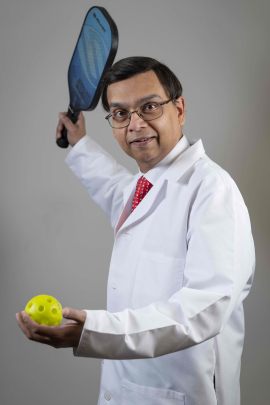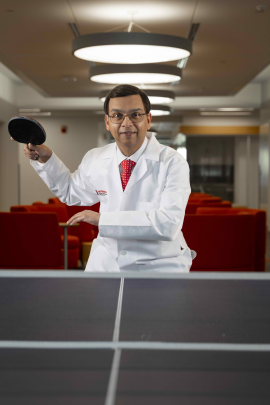Doctor Sports a Passion for Pickleball, Pingpong and Pediatric Medicine
The new chair of pediatrics at Rutgers Robert Wood Johnson Medical School, an accomplished player on the national pickleball stage, explains how competition among doctors can build a friendly workplace
For Vikas Dharnidharka, chair of the Department of Pediatrics at Rutgers Robert Wood Johnson Medical School, playing pickleball and pingpong dovetails with his role as a health care provider to children.
“I think it’s part of a pediatrician’s DNA to be empathetic, caring and humorous,” said Dharnidharka, a board-certified pediatric nephrologist, transplant specialist and Henry Rutgers Professor who also serves as physician-in-chief of The Bristol-Myers Squibb Children’s Hospital at Robert Wood Johnson University Hospital. “When we see patients, we joke with them and use small talk to build trust. These qualities are important when playing recreational racquet sports, too. Empathy and teamwork are especially important if you’re playing doubles. And these sports are much more fun if you don’t take playing them too seriously.”
When I saw a pingpong table in the middle of the hallway on the seventh floor where the chairs of both departments have offices, I immediately challenged the Medicine Department to a tournament.
Vikas Dharnidharka
Chair, Department of Pediatrics, Rutgers Robert Wood Johnson Medical School
While growing up in India, Dharnidharka played a variety of racquet sports, including badminton and pingpong. This interest continued through middle age when he began playing tennis while living in Florida. About 10 years ago, he joined a pingpong league in St. Louis. About five years ago while playing in the league, he learned about pickleball, a relatively new sport at the time.
“I find all racquet sports fun,” Dharnidharka said. “There’s physical activity involved, and also skill and strategy.”
The benefits of playing are multifold, according to the doctor. It keeps him in shape, which he believes is important to model as a physician. Compared with tennis, pickleball and ping pong are less impactful on the body and can help quicken reflexes and improve balance. Dharnidharka said he recommends medical students and residents take advantage of the pingpong tables in public spaces on campus.
“Pingpong is a good activity to do for a few minutes between obligations,” he explains. “It’s great for fitness, but also great for relaxing. There’s a table with paddles and balls where the med students sit, but I’ve not seen them play. I’d love to see them use it. Playing provides really good stress relief.”
Dharnidharka’s interest in pickleball has progressed beyond a hobby. He has competed in noncommercial tournaments at the city, state and national levels, both in singles and doubles. For the past few years, appearances on the medal podium at the Senior Olympics in St. Louis or Missouri earned him invitations to the National Senior Games for both pickleball and pingpong. Recently, Dharnidharka learned he has qualified for the fourth time for the National Senior Games in pingpong, which will take place this summer.
Dharnidharka has joined a local pingpong and pickle ball club to keep his skills sharp. His next competition is a friendly pingpong challenge he struck up between the Department of Pediatrics and the Department of Medicine.
“When I saw a pingpong table in the middle of the hallway on the seventh floor where the chairs of both departments have offices, I immediately challenged the Medicine Department to a tournament,” he said with a laugh.
The date for the tournament is March 6.
In his proposal to Jeanne Clark, chair of the Department of Medicine, Dharnidharka proposed matches for mixed doubles, women’s doubles, men’s doubles and two singles matches each for men and women.
The reward? Bragging rights on the seventh floor – and perhaps beyond. He also has spoken with a few transplant surgeons about playing as well.
“Medicine and pediatrics already compete in a softball tournament each summer,” said Dharnidharka. “I want to make it a fun experience. There’s already a culture here where the two departments interact in a friendly way, and I wanted to continue that, hopefully involve more departments.”






